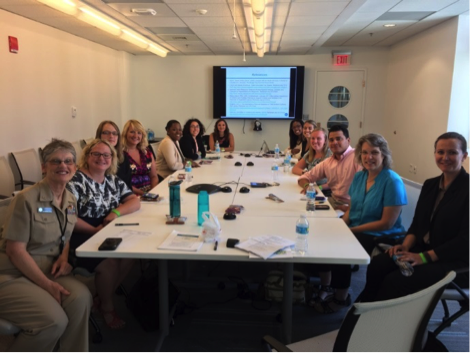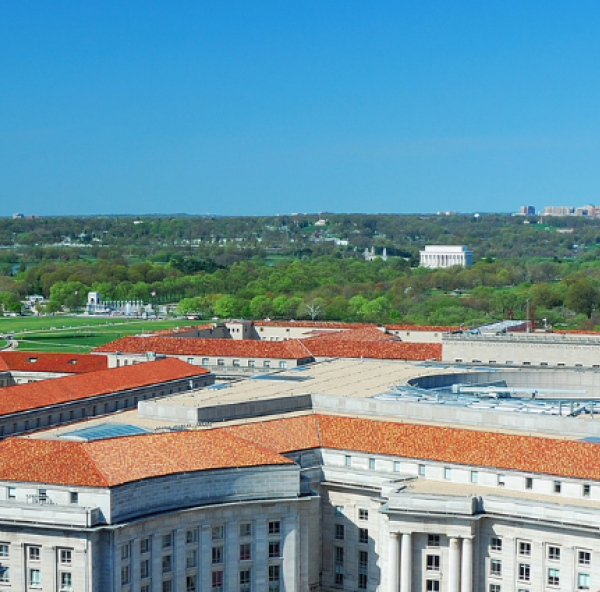On July 6, 2016, the Disaster Resilience Leadership Academcy Summer Institute student group visited the FEMA headquarters in Washington DC, escorted by FEMA Chief of Staff Michael Coen. To begin the day, the students were invited to observe the official daily morning briefing, during which the various branches of FEMA and the White House all reported on significant goings-on for their sector. Updates included the daily national, space, and storm forecasts, current FEMA disaster operations status and other topics.
The group had a Q & A session with Michael Coen and Josh Batkin, Director of the Office of External Affairs, during which the staff members answered questions about challenges they face, what they love about their jobs, how they manage stress, advice they can offer new graduates, how FEMA is ensuring their materials are accessible to all populations, and others. Tthe students were escorted throughout the building and were able to see the Emergency Operations Center (EOC) for the National Response Coordination Center (NRCC).
Mr. Coen and Mr. Batkin gave the students a tour of the employee working area, which they have recently converted into an open work space floor plan, which they say makes team, inter and intra department communication more efficient and each other more accessible.
On the following day, the DRLA Summer Institute student group had a full and informative session. The students began the day at the US Health and Human Services (HHS) Office of Human Services Emergency Preparedness and Response (OHSEPR) Administration of Children and Families Department (ACF) department. For the first few hours of the morning, the students heard from Captain Mary Riley, U.S. Public Health Services Director, about the many ways ACF and OHSEPR work to help children and families before, during, and after disasters. Captain Riley was very passionate about her work, generous in answering student questions, and encouraging to everyone about their backgrounds and futures.
Captain Riley began the session by stressing how important “psychological workforce protection” is for responders and mental health workers who are deployed during and after disasters. She discussed ways to look out for each other and ourselves and stressed to the students the importance of self-care and helping each other while deployed since secondary stress and compassion fatigue can be harmful if not given proper attention. Throughout the presentation, Captain Riley highlighted many items, including ACF’s mission, mandates, “interests" in disasters- which include: child care, child support services, child welfare & foster care, human trafficking and refugee resettlement. She also discussed logistical and operational procedures, as well as how ACF coordinates with other government branches, which we found very interesting. Additionally, she talked about how ACF was formed and their case management program- emphasizing the need to pay special attention to children and family access to child care during and after disasters.
After the session at the ACF office, the students then went across the street to the Secretary’s Response Center (SRC), in the HHS Department of the Assistant Secretary for Preparedness and Response (ASPR). Here the students heard from Lieutenant Commander Allen and staff about the very important work that ASPR does to address medical and public health emergencies, such as Zika, Ebola, and special events- such as the DC Independence Day celebration. He also stressed the importance of self-care, as well as “situational awareness”- or always being vigilant of what is going on. Overall, it was an enlightening and inspiring information-packed day at the DRLA Summer Institute.
Course information:
Disaster Policy and Operations seeks to understand the following questions:
- Why does the response to some disasters succeed while others fail?
- What disaster recovery practices result in rebuilding a more resilient community?
- What are the attributes of an effective disaster operations capability?
- What are the legal and statutory challenges en¬countered in response and recovery operations?
- How is disaster policy developed and imple¬mented?
- How do I get a job with organizations working in domestic or humanitarian disasters?
Institutions & Politics of Humanitarian Advocacy explores International and Domestic
- Humanitarian decision making
- Career paths in the field
- Practical tools for policy change
- Dynamics between diplomacy and humanitarianism, resilience, and human security
Case Studies in Disaster Operations examined and discussed
- Success/failure in disaster response
- Recovery and relief practices resulting in more resilient communities
- Impacts of social media on disaster communications
- Attributes of an effective disaster operations capability
Guest Speakers/Visits include:
- FEMA/DHS
- The World Bank
- National Voluntary Organizations Active in Disasters (NVOAD)
- USAID/OFDA
- NGOs such as InterAction and the American Red Cross
- Prominent think tanks such as Brookings Institute and CSIS Congress
- U.S. Governmental agencies such as the Department of Homeland Security and FEMA

